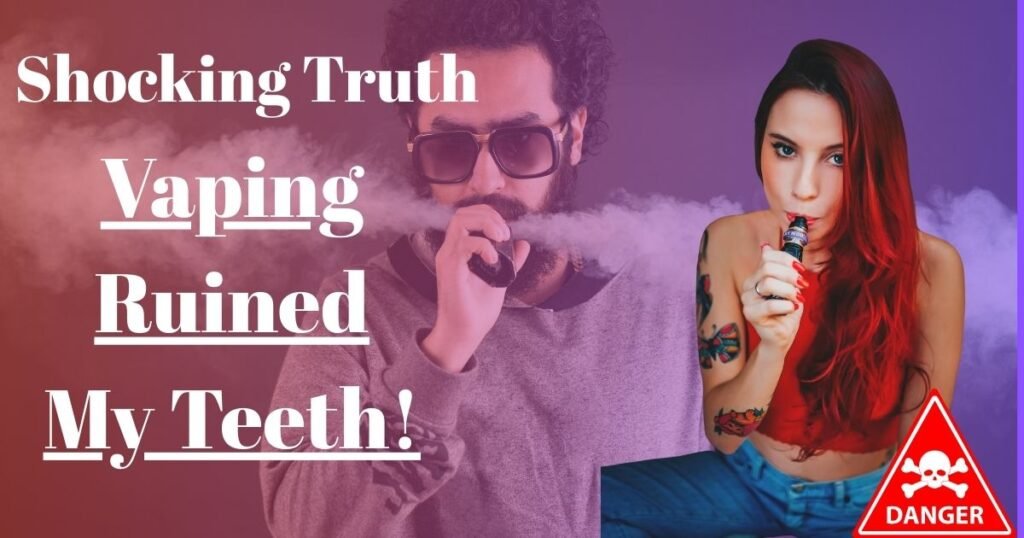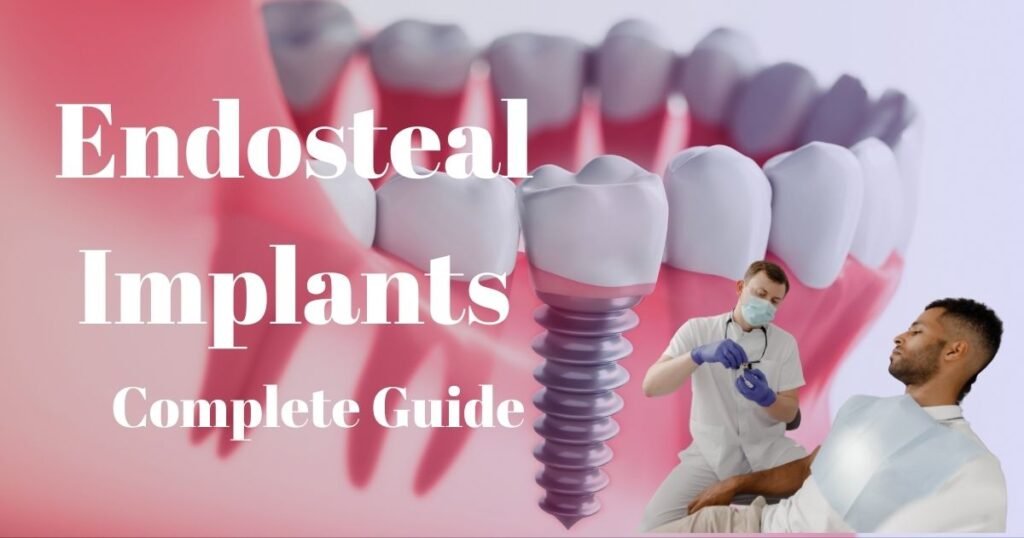Vaping, often perceived as a safer alternative to smoking, has gained significant popularity in recent years. However, emerging research indicates that e-cigarettes can have detrimental effects on oral health, leading many to exclaim, “Vaping ruined my teeth.” This article delves into how vaping affects dental health, supported by U.S. statistics and expert insights.
The Rise of Vaping in the United States

The use of e-cigarettes has surged, especially among young adults and teenagers. According to the Centers for Disease Control and Prevention (CDC), in 2022, approximately 14.1% of U.S. adults had tried e-cigarettes, with 3.7% identifying as current users. Among high school students, the prevalence is even more concerning, with 19.6% reporting e-cigarette use in 2020.
Assess the Impact of Vaping on Your Dental Health
Vaping and Your Oral Health
How Vaping Affects Oral Health
Dry Mouth (Xerostomia)
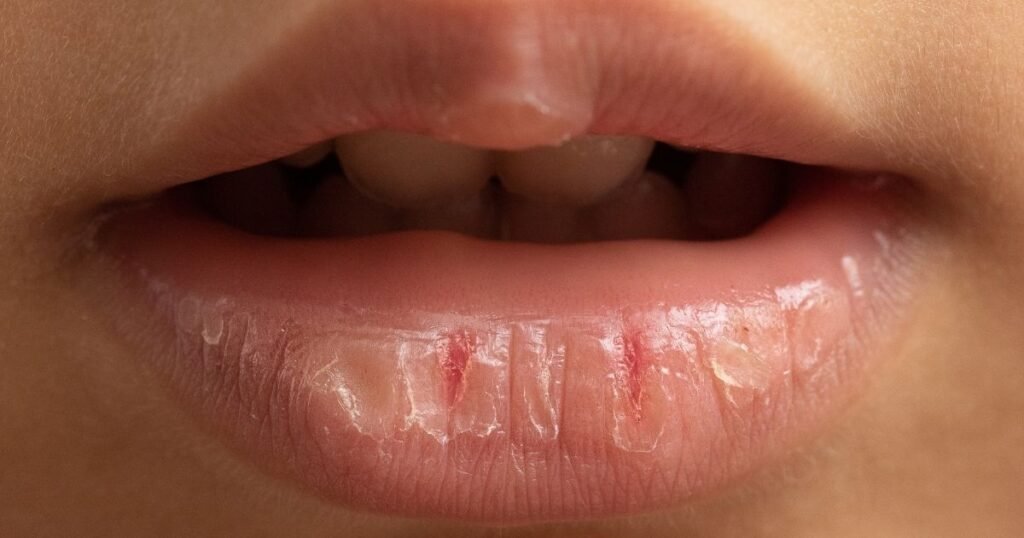
One of the most common oral health issues associated with vaping is dry mouth. The aerosol produced by e-cigarettes can reduce saliva production, leading to a dry, uncomfortable feeling in the mouth. Saliva plays a crucial role in maintaining oral health by rinsing away harmful bacteria and aiding in digestion.
Increased Risk of Gum Disease

Nicotine, whether from traditional cigarettes or e-cigarettes, can restrict blood flow to the gums, impairing their health. This restriction can lead to an increased risk of gingivitis and periodontal disease. Studies have shown that vaping is associated with an increased risk of gingivitis and periodontal disease as well as reduced antioxidant capacity of saliva.
Tooth Decay
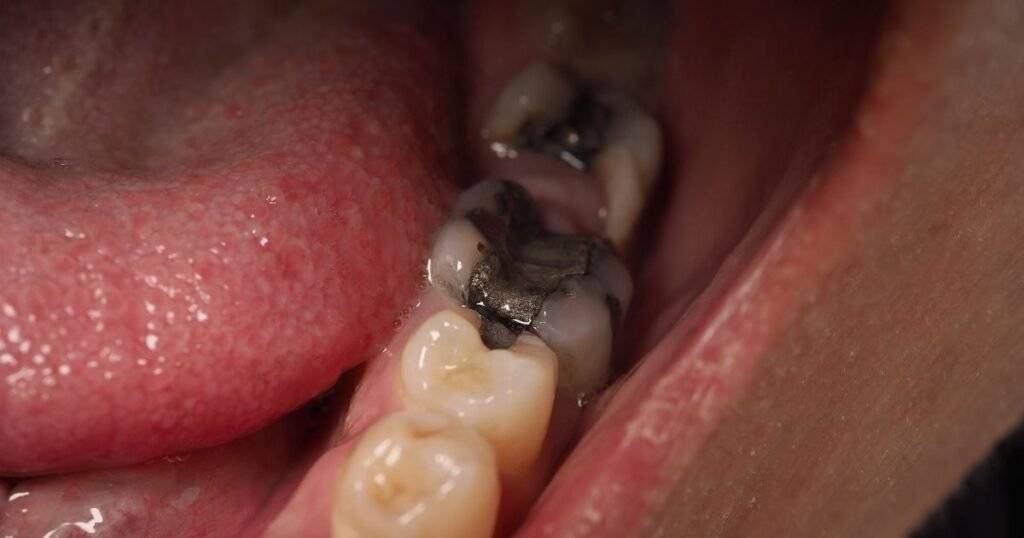
The reduction in saliva and the presence of certain chemicals in e-cigarette liquids can create an environment conducive to tooth decay. Saliva is essential for neutralizing acids and washing away food particles; its decrease can lead to an increased risk of cavities.
Oral Lesions and Soft Tissue Damage
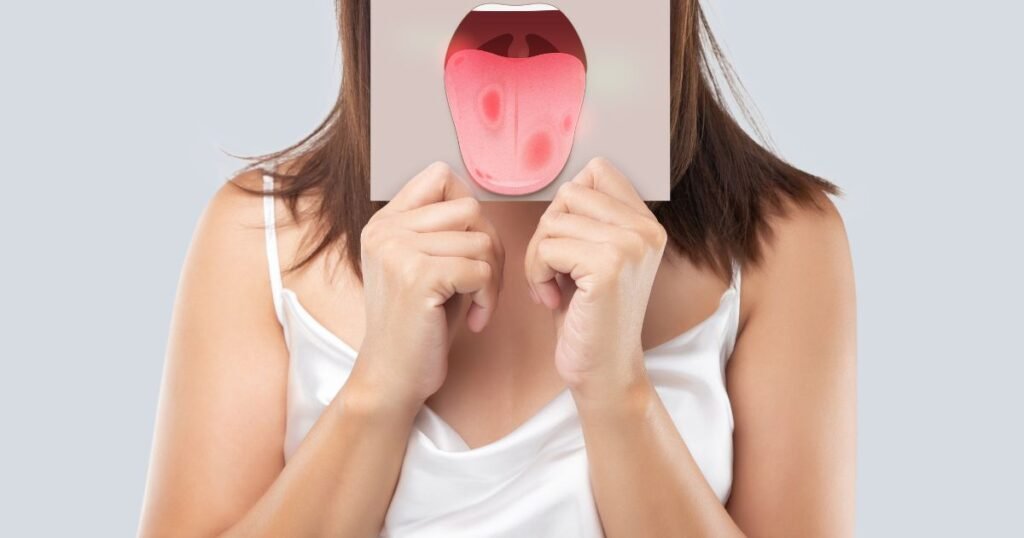
Vaping has been linked to various oral mucosal lesions, including nicotine stomatitis, a condition characterized by inflammation of the mouth’s lining. Users may also experience conditions like “vape tongue,” where there’s a temporary loss of taste, often due to the drying effects of vaping on the tongue’s surface.
Personal Accounts: The Real-World Impact
Individual experiences highlight the severity of vaping’s impact on oral health. For instance, cases have been reported where excessive vaping led to severe oral health issues, including significant damage to the gums and teeth.
Expert Opinions

Dental professionals are increasingly concerned about the oral health implications of vaping. The American Dental Association (ADA) emphasizes that dentists should be fully aware of the health risks associated with tobacco use, including higher rates of tooth decay, gum disease, bone damage, and tooth loss.
Conclusion
While vaping is often marketed as a safer alternative to smoking, its potential to cause significant oral health issues cannot be overlooked. From dry mouth and gum disease to tooth decay and oral lesions, the risks are substantial. Individuals considering vaping or currently using e-cigarettes should be aware of these dangers and consult with dental professionals to mitigate potential harm.
15 Detailed FAQs on Vaping Ruined My Teeth
Vaping has become a popular alternative to smoking, but many users are experiencing serious dental problems. From gum disease and cavities to tooth loss, vaping can have devastating effects on oral health. Below are 15 detailed FAQs explaining how vaping impacts teeth and what you can do to protect your dental health.
How does vaping ruin your teeth?
Vaping harms your teeth in multiple ways. The main issues include:
Dry mouth: Vaping reduces saliva production, making your mouth dry and increasing the risk of tooth decay.
Nicotine damage: Nicotine restricts blood flow to the gums, leading to gum disease and possible tooth loss.
Acidic flavorings: Many vape liquids contain acidic flavorings that weaken tooth enamel, making teeth more vulnerable to decay.
Bacterial growth: A dry mouth encourages bacterial overgrowth, leading to plaque buildup, cavities, and gum infections.
These effects combined can severely damage your teeth, leading many to regret ever using e-cigarettes.Does vaping cause cavities?
Yes, vaping significantly increases the risk of cavities. This happens because:
E-liquids contain sugar and artificial sweeteners that stick to your teeth, feeding harmful bacteria.
Propylene glycol (a common vape ingredient) dries out the mouth, reducing saliva, which normally washes away bacteria.
Acidic vape flavors weaken enamel, making it easier for cavities to develop.
Over time, these factors create the perfect environment for rapid tooth decay.Can vaping lead to gum disease?
Yes, vaping increases the risk of gum disease by:
Reducing blood flow to the gums, which weakens their ability to heal.
Increasing bacterial plaque buildup, leading to inflammation.
Causing dry mouth, which allows bacteria to thrive.
Early gum disease (gingivitis) can progress into periodontitis, a severe condition that destroys gum tissue and leads to tooth loss.Does vaping cause bad breath?
Yes, vaping can cause chronic bad breath (halitosis) due to:
Dry mouth, which reduces the ability to wash away food particles and bacteria.
Bacteria buildup on the tongue and teeth.
Chemical residue from e-liquids that leave an unpleasant smell in your mouth.
If you vape regularly, you may notice that your breath has a persistent stale or sweet smell, which can be difficult to eliminate.Can vaping stain your teeth?
Unlike traditional cigarettes, vaping does not produce tar, which is responsible for yellowing teeth. However, nicotine still stains teeth over time.
Some dark-colored vape flavors (such as coffee or berry flavors) can contribute to stains.
Chemicals in vape aerosol weaken enamel, making teeth more porous and prone to discoloration.
Poor oral hygiene while vaping can cause plaque buildup, leading to yellowed teeth.
While vaping might not stain teeth as quickly as smoking, long-term use still leads to discoloration.Why do my teeth feel rough or sensitive after vaping?
Vaping can make teeth feel rough, weak, or sensitive due to enamel erosion caused by:
Acidic e-liquids, which weaken the outer layer of the tooth.
Reduced saliva production, preventing natural remineralization.
Hot vape temperatures, which can irritate tooth nerves over time.
If your teeth feel rough or more sensitive to hot/cold foods, it’s a sign of enamel damage that needs immediate attention.Can vaping cause tooth loss?
Yes, vaping can contribute to tooth loss in severe cases. This happens when:
Gum disease progresses, causing gums to recede and teeth to loosen.
Bone loss occurs, weakening the jawbone that supports teeth.
Untreated cavities lead to severe decay, requiring extractions.
If you have been vaping for a long time and notice loose teeth, receding gums, or pain, it’s critical to see a dentist as soon as possible.Does vaping cause dry mouth?
Yes, vaping is a major cause of dry mouth (xerostomia). The primary reason is propylene glycol, a key ingredient in e-liquids, which:
Absorbs moisture, drying out oral tissues.
Reduces saliva production, leading to increased bacterial growth.
Makes the mouth more acidic, increasing the risk of cavities.
A persistently dry mouth not only feels uncomfortable but also increases the risk of tooth decay, infections, and bad breath.Can vaping affect dental implants or crowns?
Yes, vaping can negatively impact dental work, including:
Crowns and fillings, by increasing plaque buildup and weakening the surrounding teeth.
Implants, by slowing down healing after surgery due to reduced blood flow.
Bridges and veneers, by staining and causing gum inflammation around them.
If you have any dental restorations, vaping can shorten their lifespan and lead to complications.How does vaping compare to smoking in terms of oral health damage?
Vaping and smoking both cause:
Gum disease
Dry mouth
Tooth decay
Bone loss
However, vaping doesn’t contain tar, so it may not stain teeth as much. Still, the damage to gums, saliva production, and enamel is just as severe as smoking.Can quitting vaping reverse dental damage?
Some effects of vaping, like dry mouth and bad breath, may improve after quitting. However, gum disease, cavities, and enamel loss are permanent.
Professional treatment (deep cleaning, fillings, fluoride treatments) is needed to repair damage.
Quitting vaping stops further harm and allows your gums and teeth to stabilize.
A healthy diet and proper oral hygiene can help rebuild strength in weakened teeth.How can I protect my teeth if I vape?
If you are not ready to quit vaping, take these precautions:
Drink plenty of water to reduce dry mouth.
Use fluoride toothpaste to strengthen enamel.
Brush and floss daily to remove bacteria and vape residue.
Visit your dentist regularly for checkups and cleanings.
Avoid sugary e-liquids to reduce cavity risk.
While these steps help, quitting vaping is the best way to protect your teeth long-term.Does vaping cause oral cancer?
Research on vaping and oral cancer is still ongoing, but some studies suggest that chemicals in vape aerosol may increase cancer risk.
Nicotine and formaldehyde in some vapes are known carcinogens.
Prolonged exposure to vape chemicals can damage oral tissues, increasing cancer risk.
If you notice sores, white patches, or unexplained mouth pain, see a dentist immediately.Can vaping cause infections in the mouth?
Yes, vaping weakens the immune response in your mouth, making infections more likely.
Gum infections (gingivitis and periodontitis) are common.
Oral thrush (yeast infection) can develop due to chemical imbalances.
Sores and ulcers may take longer to heal.
Regular dental visits are crucial if you vape, as early infections can become severe.What should I do if vaping has already damaged my teeth?
If you are experiencing tooth pain, gum recession, or sensitivity, take these steps:
Quit vaping to prevent further damage.
See a dentist for a thorough examination and treatment plan.
Improve oral hygiene by using fluoride toothpaste, flossing, and staying hydrated.
Consider dental treatments like fillings, deep cleaning, or even extractions if needed.
Taking action now can prevent more serious issues like tooth loss and infections.
These detailed FAQs explain how vaping can ruin your teeth and what you can do to prevent further damage. If you vape and notice oral health issues, seek professional dental advice as soon as possible.

Dr. Niraj Ghanghoriya is a passionate dental surgeon with over 12 years of experience in clinical dentistry. He completed his BDS from the prestigious Sri Aurobindo Institute of Dentistry in 2012 and specializes in painless root canals, smile makeovers, and preventive oral care. Known for his patient-first approach and clear communication, Dr. Ghanghoriya aims to make dental knowledge accessible to everyone. When he’s not in the clinic, he enjoys writing informative dental blogs to help people take better care of their oral health.

